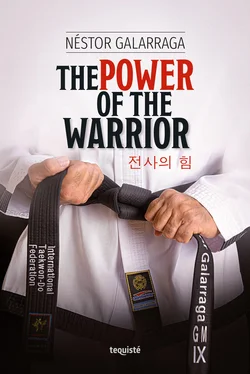This is another way to be seen and to become slaves of the viewpoint of others; a sort of reality of our intimate lives, displayed on the social screen. We need to stay in touch with thousands of people by means of Twitter, Instagram or Facebook, and to inform them of what we do, to be much solicited, and to experience the nice feeling of choosing who we grant the privilege of our friendship. But the result of this is a sense of total void. We have stopped being organic creatures. Our cellphone, for instance, is attached to our bodies, which means we have become part machines, or else, machines have become part human.
Human beings are suffering from a relationship crisis and we are totally dehumanized. Urban centers were never so populated; neither was society so communicated, so connected. However, more and more people are suffering from loneliness, sadness and vulnerability. People feel they live in a world where there is no place they belong. Stress and energetic disorders, resulting from anxiety attacks, panic, vertiginous syndrome, difficulty to concentrate, eating disorders, sleep deprivation, etcetera, are partly a consequence of the technological development of communication services.
Being friends or mates is something that is learnt, at home, in the neighborhood. It is picked up —or it was, at least— among brothers, with our parents, with the help of rituals like drinking mate, or a coffee, by talking at the table after lunch, conversing or growing next to someone. In the past, this was something valuable, and it added up quite a lot. Thus, it was taught, passed on from one generation to another, as a timeless ritual.
Learning methods allow us to save time and energy; something production methods do as well. Everything is increasingly faster. A machine replaces the labor of thousands of workers; everything is progressively more efficient. In terms of education, memorization of concepts and knowledge like an encyclopedia was replaced by teaching to think, yet this is also questionable. We teach to think but not to learn. Quite strange, isn´t it? Currently, education is being “mechanized”, by separating it from the art of teaching. In the past, the teacher had more power. Today the word master (a person having an extraordinary ability or mastering the subject he or she instructs) has been replaced by teacher (a person that conveys knowledge and whose position towards the subject matter he or she teaches is much weaker), thus the trade, the art, gets lost and it becomes a more regulatory and prescriptive system. On the one hand, a teacher is bound by a set of rules; on the other, the freedom of concept is lost and the art of teaching gets separated from the art of educating.
Nowadays, information is available to all, at the touch of a bottom. And it is confusing. There is too much information and there is no need to hold any kind of knowledge. If you know how to use a calculator, you will be able to solve any mathematical calculation or equation. Moreover, everything is stored by artificial memories, which are available to anyone. Everything is in Google, Yahoo, etcetera.
Children know how to handle our complex new technology and computing software, and they can access a certain type of knowledge from the Internet, but they ignore simpler things that are even more important. For example, they ignore the value of games that are there to teach them about the responsibility of making friends or becoming part of a team, among other lessons. Kids do not get involved in any kind of participative method —it is said, but not done— and this is a basic and most significant educational problem.
Adolescence is essentially a time of change. It is the stage where the transformation of a child into an adult takes place. They are adolescents because they are children no more, but they are not adults yet. They go through a process of hormonal changes and, from the emotional point of view, their main characteristics are that they start to particularize affection, to discover their own individuality and sexual identity. It is the period where the search for their own autonomy starts, a process that extends from 12 to 19 or 20 years old. In the past, this stage was misrepresented as “the awkward age”; it was shorter (ages 11 to 16) and it was common to hear that girls aged or became more mature faster than boys. There were always particular differences regarding certain characteristics and gender issues. Nonetheless, today it is said that adolescence was stretched up to the age of 30. Quite an extensive process… don’t you think?
Adolescence was always considered to be a period of certain contradictions. Nowadays, the lack of educational support, of clear differences within the model containing the teacher-student relationship and the non-attachment to rules, to order and discipline have added more confusion to the one in existence already. There is this new idea in the adolescent world stating that they are the ones who should reform or revolutionize education. Thus, in line with those they consider to be their peers (teachers), they take possession of their schools to force guidelines that will restructure the educational system. We may add that their own parents support this conduct, accompanying their kids in the commission of a crime. Taking possession of a school is a crime or, at least, it is a true sacrilege against the world of education. Probably, these actions will cause an irreparable or, at least, a greater damage. But adolescents are not aware of this, because they have not yet acquired the ability to foresee the future. It is striking that their parents have not acquired it either. It is crazy to try to put out a fire by using gasoline.
Also, every week many adolescents end up in an emergency room from alcohol poisoning, drug abuse or the many forms of violence that have lately invaded their word. There is also bullying, discrimination and sexual abuse. What is more striking about these cases when they are exposed is that these kids, mostly, are justified, supported and accompanied in their behavior by their parents and, sometimes, by their teachers. Are these the youngsters who want to reform the educational system? I believe these kids have realized that they can fight it all, that the truth of their teachers and parents is relative, as justice is relative to them, and they deem the police force to be an organization of unacceptable people. These kids understand they have won a terrain and they are not willing to let it go; they know that they will not be kicked out of school or sent to jail, because they see it is as simple as entering through one door and exiting through another one. Yet, unfortunately, this does not constitute progress whatsoever, because children do not know where to go. There is, in everything, a “tiny” confusion where adults have ceased to be adults and we have invited kids to stop being kids… With this tale of individual freedoms, parents have stopped being parents, teachers are not teachers anymore and children, obviously, as a consequence, have stopped behaving as sons, daughters and students. It is absolutely necessary that, as parents and teachers, we finally understand that certain things are not open to discussion with our kids or students; some things are non-negotiable, for instance, tidiness, punctuality, class attendance, discipline, ethics, humility, moral behavior and respect to the authority.
In sports, fare game should be taught when it comes to competition, the respect of a rival and, both at home, at school and the sports field, the absolute respect towards the principles and values aiding a society to be more just, integrated and inclusive. All these matters should not become part of a debate, neither with our children nor with our students. Adults must start behaving like adults once again, laying down the rules of the game, and demanding our kids and students to act accordingly… The whole community needs new examples and the children of our society need to learn from parents and teachers that offer a world that is safe to grow and live in; they should teach with the certainty of a guidance throughout a clear path, because they know where they are going and what they need to get there. Within this overall picture, some things might be talked and they might even be open for discussion with our children and students, yet some things may not. And this difference should be part of a policy in all social classes; kids should know that the more possibilities you are given, the more caring you need to be. We must all rescue solidarity and make it a fundamental value.
Читать дальше












